On April 16, 2015, the U.S. House of Representatives held a floor vote on the stand-alone estate tax repeal legislation proposed in The Death Tax Repeal Act of 2015 (the Act), sponsored by Reps. Kevin Brady (R-TX) and Sanford Bishop (D-GA). The Act passed the House by a vote of 240-179, with only 7 Democrats voting in favor. The House Ways and Means Committee released a statement before the voting, which noted in part:
The death tax hurts family businesses and farms. Death should not be a taxable event. Though it represents just a tiny fraction of federal revenue, the impact on a family can be enormous. The death tax can force a family to sell off parts of a business or farm, lay off workers, or shutter a business entirely. Assets that can trigger the death tax include land, property, and equipment. And a death-tax liability is often greater than a family business's liquid assets. In fact, the death tax is one of the biggest reasons that family businesses have to close up shop.
This is the first vote on this matter since April of 2005 and comes only days after President Obama’s office issued a Statement of Administration Policy strongly against the Act. It took a decidedly different tact than the Ways and Means Committee, stating in no uncertain terms that:
Repealing the estate tax exclusively benefits just the wealthiest one or two estates out of every thousand—which would receive a tax cut averaging more than $3 million each—because current law already exempts more than $5 million of wealth for individuals and more than $10 million of wealth for couples from the tax. Given these large exemptions, well over 99 percent of Americans, including virtually all small businesses and family farms, do not pay any estate tax. H.R. 1105 would also shift a greater share of the tax burden onto working Americans at a time when the top one percent already holds more than 40 percent of the Nation's wealth and wealth disparities have risen to levels not seen since the 1930s.
The next stop for this bill is the Senate, where it appears Democrats have enough votes to block it. However, even if it improbably passes there, the above statement by the administration makes a Presidential veto seem inevitable. Given the relatively narrow voting margin, it appears unlikely that the bill could be forced through (though that sort of prognostication is murky at best at this point). That being said, this is the furthest such a bill has progressed in about a decade and is something that estate planners should keep an eye on.





